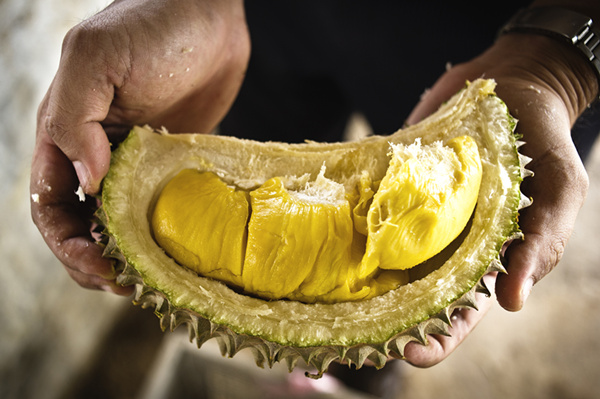 |
|
The yellow flesh of a durian, shown above, is contained inside the fruit's spiky exterior, below. [Photo/Agencies] |
When my friend Bob Halliday thinks about durians, the tropical fruit that some say smells like garbage, he not only salivates with delighted anticipation, but he also "foams like a geyser". Those were the words he used on the eve of our visit to an orchard north of Bangkok that was filled with these green spiky fruits dangling dangerously from towering trees.
I confess to the same passion with what must be the world's smelliest fruit.
What is it about the durian? Shaped like a rugby ball with large thorns that can pierce even the most callused hands, durian stinks so badly that it's banned from airplanes, hotels and mass transit in most Southeast Asian cities. In a part of the world where rules are constantly bent and broken, carrying a durian into confined spaces is not taken lightly, punishable by scowls or eviction.
Yet aficionados like Halliday and me will travel terrible distances, cancel important appointments - do anything - to scarf down globs of custardy flesh from a durian. While many Thais like their durians harvested early so the interior is still hard and can be neatly handled, I like an over-ripened durian, which has the consistency of cottage cheese. It's a very messy affair.
It goes without saying that durian is a polarizing and controversial fruit. (I take pleasure in typing that sentence because there is probably no other time you can combine "controversial" and "fruit".)
There is a long tradition of durian haters who cannot get past the smell and gooey-ness of durian, especially among Western visitors to Southeast Asia. Simon de La Loub��re, a French diplomat who came here in the 17th century and wrote with unusual empathy about the Kingdom of Siam, drew the line at durian, describing it as "unbearable" because of its smell.
But as a foreign correspondent for nearly two decades who has always sought to write fairly and dispassionately, I dispense with objectivity for a moment and attempt an ode to what the Malaysians rightly call the king of fruits.
Yes, I freely admit that when ripe it can smell like a dead animal. Yes, the fruit is difficult to handle, bearing likeness to a medieval weapon. But get down to the pale yellow, creamy flesh, and you'll experience overtones of hazelnut, apricot, caramelized banana and egg custard. That's my attempt at describing durian. But words fail; there is no other fruit like it. Halliday compares it to the works of Olivier Messiaen, the 20th-century French composer: complex, dissonant, but with an overall impression of sweetness.
The first time I tasted durian was when I was posted in Kuala Lumpur 15 years ago. Trucks piled high with the fruit would come in from the Malaysian countryside, and I would spend evenings sitting with friends on plastic stools by the roadside sampling different varieties. Unlike the Thais, who cut durians down from trees, Malaysians usually wait for them to fall. The result is a much riper and stronger-tasting durian, sometimes slightly fermented. Durian farmers in Malaysia have been known to wear helmets: No one wants to be on the receiving end of a five-pound spike-bomb. Malaysians also believe that durian is an aphrodisiac. When the durians fall, the sarongs go up, goes a Malaysian saying.
We live in a time when chemists and cooks have joined hands to concoct foods of unrivaled complexity in everything from packaged snack food to wallet-crushing meals at Michelin-starred restaurants.
|
|
|
|
|
|
|
|
